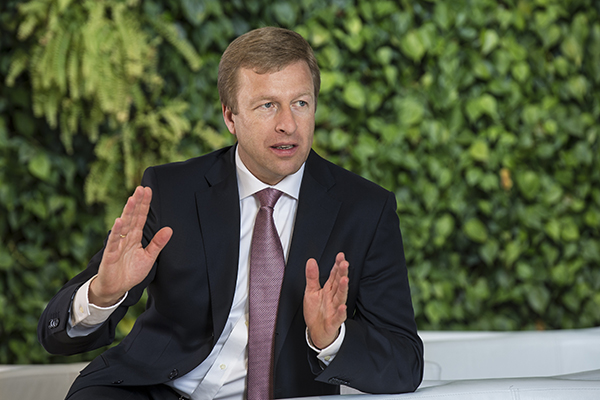 |
|
Oliver Zipse, a member of the management board of the BMW Group. [Photo provided to China Daily] |
Joint venture trains staff for Shenyang engine production facility in Munich, Germany
BMW's joint venture has brought world-leading technologies to its new engine plant in Shenyang, and is set to start producing its next generation lightweight engine this year to meet Chinese market demands.
The BMW Brilliance Automotives engine plant in Shenyang, Liaoning province, serves as the BMW Group's first competence center outside of Europe, and realizes the complete engine production process from foundry to final engine assembly in one location, according to the company's news release.
Oliver Zipse, a member of the management board of the BMW Group, said: "The new engine plant production will be adjusted to demand. For example, when the market needs 400,000 units of locally made BMWs, the plant will make the same amount of engines to match."
The Shenyang plant is currently in trial production and its production of the latest 3-cylinder and 4-cylinder B series engines will increase next year, to replace the current N series engines step by step in the coming new models.
Staff members at Shenyang have been participating in training programs including practical training at BMW's Munich engine plant. A slew of Shenyang staff members have been working on engine production in the Munich plant to prepare well for their future responsibilities at the Shenyang plant.
Zipse said: "The training programs are carried out to secure consistency in BMW quality. The Chinese workers observe and learn how people work here in Germany. When they go back to China, they will put what they learn into practice and train more of their fellows to carry on the same standard.
"We insist on the BMW quality standard, and we don't compromise on production quality."
The Chinese staff members are working on the world-class engine assembling lines every day and contribute to the production of each engine. Each individual has an area of responsibility, and the roles are rotated so each becomes familiar with the entire section.
Many BMW Brilliance Chinese trainers in Shenyang were also trained in the German plants, as the production teams are recognized as an indispensable part of BMW Group's global production network, which consists of engine plants and production and planning facilities in Germany, the UK, Austria and China.
The new engine plant in Shenyang also shares locally gained know-how with other locations as needed as part of BMW's unique collaboration.
The BMW engine production network started introducing the latest generation of three, four and six-cylinder high-tech petrol and diesel engines in 2013.
The engines have a standard design, a high amount of common parts and a uniform manufacturing process.
Therefore, synergies across the network can be utilized and production between plants is optimized.
With this efficient and uniform production system and the international engine, the production network can react quickly to customer demand, according to the company.
Olaf Kastner, president and CEO of BMW Brilliance, said, "The Shenyang plant will be more advanced than any other BMW plant, and will become the modernist BMW plant.
"We will also bring the world-leading innovative wire arc spraying technology to the Shenyang plant, and will also further upgrade the sand core molding technique in Shenyang."
In 2013, BMW introduced a wire arc spraying, or LDS, process in the production of die-cast aluminum in crankcases, as the first in the world to use the technique in large-scale series production.
By applying the LDS technology, BMW makes each cylinder 400 grams lighter. The LDS technology replaces the industry's commonly used heavy cast steel sleeve in the cylinder with a thin coat of an iron-based material just 0.33 millimeters thick.
The innovative LDS technology gives the engines resistance to friction, reduces fuel consumption and prolongs the service life of the engine. Cylinders coated using this technology are also extremely robust both thermally and mechanically, according to the company.
BMW is now operating a zero-emissions sand core molding technique in its alloy foundry in Landshut, Germany. The plant has been using environmentally friendly inorganic binding agents since 2009, instead of conventional organic binding agents.
The sand core molding technique ensures that the plant causes little impact on the environment, as the light-metal foundry has reduced emissions by around 98 percent from combustion residues.
"The used sand cores are recycled in Landshut. The plant sells the sand to infrastructure constructors to reuse in cement or refill into the land. We are considering the same practice and contacting partners," Kastner said.
Chinese media reported that BMW Brilliance is about to expand its new engine plant in Shenyang to a projected capacity of 600,000 units. Three new BMW models are also in the joint venture's future localization plan.
Dong Yang, secretary general of the China Association of Automobile Manufacturers, said it is a good time for automakers to develop their production capability and elevate their quality, while the growth of Chinese auto demands is waning.
FAW-Volkswagen's Changchun engine plant went into production in May with a 450,000-unit capacity, which will be doubled by 2017.
Guangqi Honda's engine plant started production in Guangzhou with a capacity of 120,000 units, which will also be doubled in the future.
